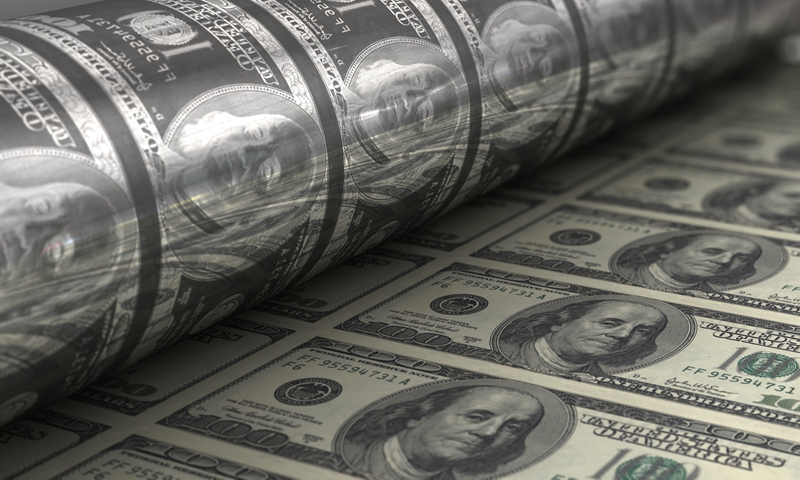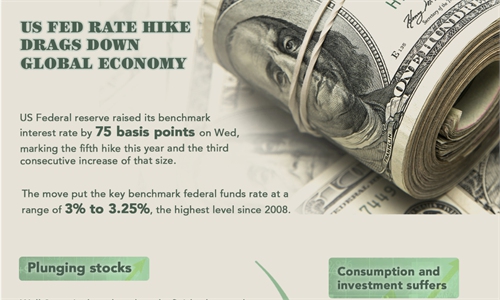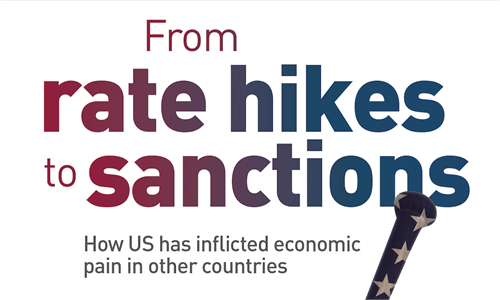Fed reckless tightening stokes global economic recession risks, but Chinese economy may act as a stabilizer: analysts

A woman shops for groceries at a supermarket in Monterey Park, California on October 19, 2022. Food prices in September rose 13 percent over last year, according to data released by the US government, as inflation raises prices to its highest levels in decades. Photo: VCG
A new US Federal Reserve Board (Fed) survey indicates generally moderating price rises but stokes growing concerns about a recession, and Chinese analysts said that US monetary policy - including continued rate hikes - will continue to weigh on the global economic recovery.
Meanwhile, analysts said that China will continue its independent monetary policy and the Chinese economy is geared toward coping with the massive negative spillover effect of the Fed's irresponsible policymaking, while acting as the stabilizer as the world heads into uncharted territory in 2023.
US economic activity expanded modestly since the previous report, the Fed said on Wednesday in its latest Beige Book for October, a survey of economic conditions based on information collected from its 12 regional reserve banks.
The survey said that growth in selling prices was mixed among different districts but "expectations were for price increases to generally moderate." This prompted discussions that the Fed's aggressive interest rate hikes may have worked to turn the tide against inflation.
Notably, mentions of "recession" in the survey increased to 14 times from 10 in September.
The Fed survey came amid gloomy media reports. Bloomberg reported on Monday that a US recession is "effectively certain" in the next 12 months, based on its economic model. JPMorgan Chase CEO Jamie Dimon on Monday warned in a CNBC interview that a mix of headwinds was likely to tip both the US and global economies into recession next year.
Despite the Fed being adamant that controlling inflation is its top priority, experts doubted whether it could turn a blind eye to recession risks.
"The Fed has to consider such risks. The right question to ask: Will inflation be lower if a recession is in place?" Li Yong, senior fellow at the China Association of International Trade, told the Global Times.
Analysts said that so far, some 90 countries and regions have moved to raise interest rates to stem the risk of capital flight caused by the US Fed's aggressive rate hikes, and as a consequence, their own economic recoveries were suppressed.
The Fed's policies are causing the global recovery to lose momentum, as countries grapple with increased import costs and diminishing monetary policy choices, Li said.

Photo: VCG
Cao Heping, an economist from Peking University, told the Global Times on Thursday that the Fed may need two or three more rate hikes to tame inflation.
In September, US inflation stood at 8.2 percent, near a 40-year high.
The US is lucky in not seeing double-digit inflation, and a significant portion of the negative impact has been transferred to the world, Cao noted.
Many countries continue to feel the pain caused by disruptive US policies. For example, preliminary data released by Japan's Finance Ministry showed a trade deficit of 11 trillion yen ($73 billion) for the April-to-September period, the highest half-year number in yen terms since official figures began to be published in 1979, according to NHK.
However, China still has the freedom to maintain an independent monetary policy, not having to react to US moves and basing its decisions on its economic fundamentals, Li said.
China will be further supported by the potential in its export sector, and its generally stable balance of payments could help ward off external risks, Li noted.
Cao said that China needs to further develop its real economy and develop internet-connected technologies to ward off the negative impacts of the Fed's monetary tightening.
In its latest World Economic Outlook report, the IMF lowered China's 2023 growth projection to 4.4 percent from the previous reading of 4.6 percent, while that of the world economy was lowered to 2.7 percent from 2.9 percent.
However, China will remain the fastest-growing among the world's top three economies, with the US projected to grow at 1.0 percent and the eurozone expanding at 0.5 percent.
Some experts noted that China has unique opportunities.
In an interview with inewsweek, Liu Yuanchun, president of the Shanghai University of Finance and Economics, said that slowing economic growth is a global trend, but China's low inflation, the potential in its less-developed middle and western regions, and its huge domestic market will provide a cushion.




